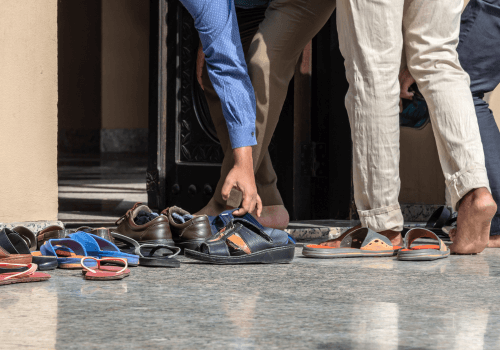How to adapt to life in Malaysia as an international student?
April 16, 2024
Anis

Embarking on a new educational journey in Malaysia as an international student can be both exciting and challenging.
While you're enthusiastic about immersing yourself in academic endeavors and discovering a rich culture, adapting to unfamiliar surroundings presents its own hurdles.
This article aims to furnish you with useful advice and perspectives to facilitate your adjustment to Malaysian life, enabling you to optimize your experience academically and culturally.
What are the examples of Malaysian etiquette and social norms?
Understanding Malaysian etiquette and social norms is essential for international students to navigate daily interactions smoothly and respectfully.
Here are some key aspects to be aware of:
1. Respect for elders
Respect serves as the cornerstone of social interaction within Malaysian society, deeply woven into the fabric of our cultural values.
As you navigate social interactions, it's essential to understand that this reverence extends to the honoring of elders and individuals of higher social status.
One customary practice that you'll encounter is the utilization of honorific titles.
When addressing elders or individuals of esteemed status, it's customary to use titles such as "Encik" for men and "Cik" for women. This gesture signifies respect contributing to a harmonious social environment.
Additionally, maintaining appropriate eye contact is crucial in Malaysian culture.
While direct eye contact is generally acceptable, it's important to avoid prolonged or intense gazes, especially when interacting with elders or superiors.
In your interactions, using polite language and avoiding speaking in raised tones are also important cultural norms to adhere to.
These gestures collectively contribute to fostering a respectful atmosphere in Malaysia, promoting mutual understanding and cohesion within the diverse community.
2. Common gestures - using right hand and personal space
In Malaysian culture, gestures hold considerable significance, shaping various aspects of your social interactions and communication.
You'll find that the utilization of your right hand takes precedence in most situations, whether you're shaking hands, enjoying a meal, or passing objects between individuals.
However, when it comes to shaking hands, it is important to consider the opposite gender due to religious teachings.
For instance, Muslims typically refrain from shaking hands with individuals of the opposite gender.
Furthermore, public displays of affection are typically viewed with disapproval within Malaysian society.
As you navigate social settings, it's important to maintain a degree of decorum, respecting the cultural norm that underscores the importance of personal boundaries.
Exercise restraint in expressing romantic affection or intimacy in public spaces, recognizing the need to uphold social etiquette.
Moreover, the concept of personal space holds significant importance in Malaysian etiquette. You'll notice that people generally value their personal space and expect others to do the same.
Therefore, it's essential for you to be mindful of maintaining an appropriate distance when interacting with others.
3. Removing your shoes before entering a house

In Malaysia, it is customary to remove your shoes upon entering a home. This tradition, deeply rooted in cultural values and practical considerations, is a sign of respect and cleanliness.
The reasons behind this practice are multifaceted. Firstly, when visiting a local’s home, removing shoes signifies respect for the homeowner and their space.
Shoes, worn outdoors, can track in dirt and dust, so by removing them, you help ensure that the living area remains clean and comfortable for everyone.
Most Malaysian homes have designated areas near the entrance for storing shoes, and some may even offer slippers for guests to wear indoors.
4. Modesty in attire
As you embark on your journey through the diverse and vibrant tapestry of Malaysian culture, embracing modest attire becomes an essential aspect of demonstrating respect and appreciation for local customs.
This practice holds particular significance when visiting religious sites or participating in cultural events, serving as a tangible expression of reverence for tradition and religious beliefs.
It's advisable for you to avoid overly revealing clothing, especially when attending religious ceremonies or visiting sacred sites where modesty is held in high regard.
5. Be mindful of your noise level
As an international student, being mindful of noise levels is an essential aspect of adapting to local customs and fostering a harmonious environment.
Maintaining moderate noise levels like lowering your voice when conversing in public spaces, demonstrates respect for those around you, whether it be fellow commuters on a train or families enjoying a meal at a restaurant.
Excessive noise can be disruptive and inconsiderate, hindering others from concentrating, relaxing, or simply enjoying their surroundings.
6. Community dining with Malaysians

In Malaysian dining customs, it is common to share communal dishes using serving utensils.
This tradition highlights the importance of dining together and promotes a sense of closeness among those sharing the meal.
Additionally, it's seen as courteous to wait for your elders to start eating before you do. This shows respect for their position and recognizes their leadership within the family or social setting.
Following these dining traditions helps create a pleasant and respectful dining atmosphere, fostering unity and a feeling of camaraderie among all diners.
7. Be understanding to other religions
As an international student in Malaysia, it's important to be mindful of cultural sensitivities, particularly when interacting with Muslim friends.
For example, it's essential to consider their dietary restrictions and preferences. If you have Muslim friends, be considerate of what they are forbidden to eat or drink.
If you're uncertain about their specific dietary needs, you can ask them beforehand to ensure that everyone feels comfortable and included.
Additionally, Muslims are obligated to perform prayers five times a day at designated times.
If a gathering coincides with these prayer times, it's important to be understanding and accommodating. Allow your Muslim friends to excuse themselves to fulfill their religious obligations.
You can either resume the gathering after they return or use the time for quiet activities that don't require their full attention.
This demonstrates respect for their religious practices and fosters an inclusive and considerate environment for all participants.
8. Academic settings
In academic settings in Malaysia, it's important to respect the established norms. For instance, you must refrain from interrupting lectures or discussions and give your full attention to your lecturers.
So, how can you effectively manage your classroom experience at universities in Malaysia?
You have a couple of options, such as you can ask questions to your lecturers after the class has ended, or when they are available for any concerns or questions.
Alternatively, you can also arrange a personalized consultation based on your lecturer's schedule availability.
However, before you consult your lecturer, you must prepare relevant questions to ensure fruitful discussions.
Also read: Understanding University Grading System in Malaysia
What are the common challenges faced by international students in Malaysia?
International students often face challenges such as cultural adjustment, language barriers, homesickness, and others. Let's explore each challenge below:
1. Culture shock
Studying in an unfamiliar country involves more than just practical adjustments like dealing with different currencies; it also entails understanding subtle aspects such as cultural disparities and traditions.
The university setting may expose students to a unique culture, necessitating some level of adaptation.
This might include navigating formalities with professors and authority figures, as well as acclimating to various classroom structures.
To better prepare for these challenges, international students should conduct thorough research on their destination country before making the decision to study there.
Additionally, observing local customs and not hesitating to ask residents to explain their social norms can be beneficial.
Adapting to a new culture and settling into an unfamiliar country may take time, so it's important to invest effort in learning about local customs and traditions.
Also read: Studying Abroad Tips: What Should You Do Before Coming to Malaysia?
2. Homesickness
Adjusting to a new culture inevitably brings moments of homesickness. Homesickness may be overwhelming at times; however, your academic journey in Malaysia is just temporary.
So, how can you ease the feeling of homesickness?
One effective way to cope with homesickness is by maintaining connections with your family and friends back home through video calls and social media platforms.
Additionally, you can also seek support from fellow international students and university counselors. They can provide valuable understanding and camaraderie during this transitional period.
Besides, don't forget to engage in self-care practices, such as exploring new places in Malaysia, regular exercise, and finding a new hobby.
You might even discover a passion for adventurous activities like hiking. These practices can help alleviate stress and enhance your overall mental well-being.
3. Academic challenges
Transitioning to universities in Malaysia may involve encountering various academic challenges.
This includes unfamiliar teaching approaches, diverse assessment methods, and differing academic standards.
Adjusting to these disparities can be initially daunting as you familiarize yourself with the academic landscape.
Understanding the university's requirements and expectations may seem overwhelming at first.
Therefore, you must utilize orientation programs, academic support services, and student networks to become accustomed to the academic environment.
Establishing strong relationships with lecturers and peers is essential.
Don't hesitate to seek clarification when necessary, as maintaining open communication with faculty and classmates can aid you in understanding and integration within the academic community.
4. Language barriers
While English is commonly used in academic and urban settings, having a good command of Malay can greatly enrich your interactions and help you blend into Malaysian society more seamlessly.
Taking language classes or joining language exchange programs can be effective ways to enhance your Malay language skills.
Being proficient in the local language not only makes communication easier but also shows your respect for Malaysian cultures.
Moreover, languages like Mandarin and Tamil are widespread in Malaysia, adding diversity to the linguistic landscape and providing opportunities for cultural exploration.
With various language options available, many students find that initial language barriers can be overcome with focused learning and immersion.
In just a few months, students often make significant progress in learning Malay, which enhances their academic and social experiences in Malaysia.
Also read: Language and Communication Tips for International Students Studying in Malaysia
5. Dietary adjustments
Malaysian cuisine is well-known for its diverse flavors, ranging from mild to spicy, which can be a challenge for those accustomed to different types of food.
Adjusting to Malaysian dishes often means navigating unfamiliar flavors and ingredients, which may feel overwhelming at first.
Finding dishes that suit your taste may take some time and experimentation.
For international students who reside in off-campus accommodations, you can tackle this challenge by cooking at home.
This gives you the freedom to customize dishes according to your preferences and helps you become familiar with Malaysian ingredients and cooking techniques.
Additionally, universities in Malaysia offer various food options other than Malaysian cuisine. Choices range from Arabic and Western to Chinese and others, providing diverse culinary experiences for students to explore and enjoy.
Alternatively, trying local dishes and gradually expanding your culinary horizons can be a rewarding experience.
Being open-minded and willing to try new things allows you to discover unique flavors and culinary traditions.
With each culinary adventure, you'll gain a deeper understanding and appreciation for Malaysian cuisine.
How can international students learn Malaysian traditions and customs?
1. Embrace local festivals and events
Malaysia hosts a rich array of vibrant festivals and celebrations all year round. These joyous occasions include Chinese New Year, Deepavali, Hari Raya, and Hari Merdeka (Independence Day).
Participating in these events provides a firsthand experience of the country's diverse cultural landscape.
You can witness traditional customs, sample local delicacies, and engage in respectful conversations with locals to gain a deeper understanding of the significance behind these celebrations.
2. Engage in local crafts and activities

Malaysia provides numerous opportunities to explore its rich heritage of traditional crafts and arts.
You might want to attend batik-making workshops, which are commonly found in Kuala Lumpur and particularly on the east coast of Malaysia.
Participating in such activities allows you to appreciate the skill and dedication of local artisans.
It also deepens your understanding of the cultural importance and stories behind these practices.
4. Discover historical sites and museums
You can embark on a journey through Malaysia's captivating history by exploring its historical landmarks and museums.
Consider visiting historical hotspots such as Melaka and Penang, each providing insight into the country's diverse cultural heritage.
These places offer an opportunity to understand the history of Malaysia, its people, and its culture.
5. Connect with local communities
Another way for you to learn Malaysian traditions and customs is by building relationships with locals.
As an international student, you can participate in volunteering activities at your institution.
By participating in such activities, you can widen your perspective towards Malaysian society and have the opportunity to converse with the local community.
You can also start by asking locals questions during your exploration of tourist spots.
These interactions can foster meaningful connections and provide invaluable insights into the everyday lives and cultural nuances of Malaysian society.
Kickstart your education in Malaysia
We'll help you find and apply for your dream university
You might be interested in...
- Promoting Inclusivity at Malaysian Universities: Tips for Malaysian and International Students
- Taking IELTS test in Malaysia: Tips, Tricks, and Key Info
- How Asia Pacific University (APU) in Malaysia Prepares Students for the Future of Marketing Using AI
- Sunway University Tops Times Higher (THE) Rankings in Malaysia
- Discovering Academic Opportunities and Pathways at APU after SPM and IGCSE
- Asia Pacific University's (APU) Innovative Initiatives Prepare Students for Industry 4.0
- Sunway College emerges as Malaysia's best performing Cambridge GCE A-Level College in 2024
- Sunway University Wins Outstanding Support for Students Award
- Sunway University Partners with Universiti Kebangsaan Malaysia to Offer Medical Doctor Programme
- Sunway University Leads the Way as Host of THE Asia Universities Summit








